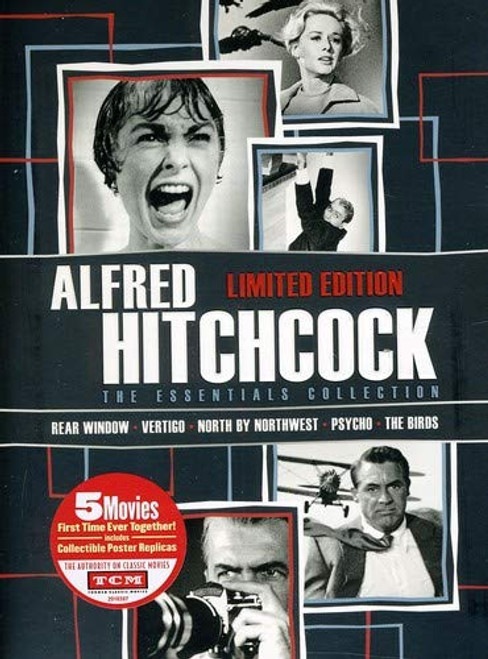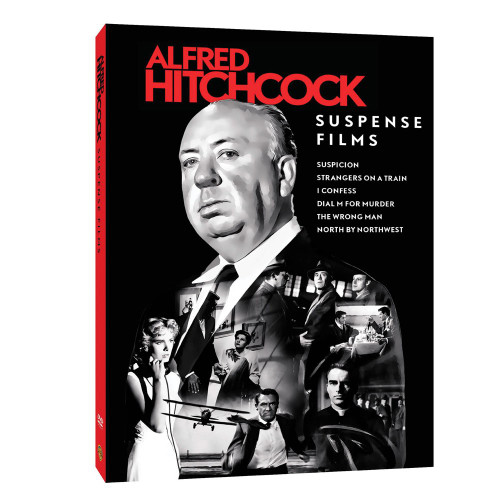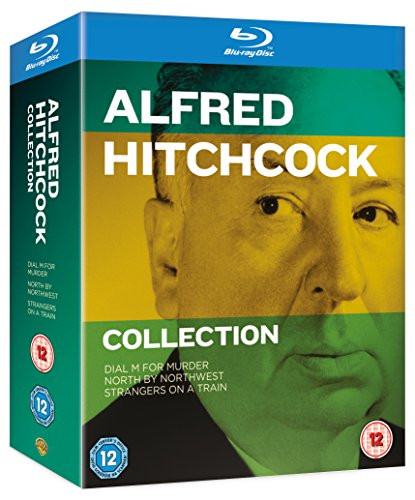Product Description
The legendary Alfred Hitchcock is recognized for directing some of the most unforgettable and groundbreaking films of all time. Now, for the first time ever, five of the most iconic films from The Master of Suspense are available together in Alfred Hitchcock: The Essentials Collection including Rear Window, Vertigo, North by Northwest, Psycho and The Birds. Starring Hollywood favorites James Stewart, Cary Grant, Grace Kelly, Anthony Perkins, Janet Leigh, Tippi Hedren, Eva Marie Saint, Kim Novak and Rod Taylor, this essential collection captures the most memorable moments in the career of a true cinematic master.
Amazon.com
Psycho
For all the slasher pictures that have ripped off
Psycho (and particularly its classic set piece, the "shower scene"), nothing has ever matched the impact of the real thing. More than just a first-rate shocker full of thrills and suspense,
Psycho is also an engrossing character study in which director Alfred Hitchcock skillfully seduces you into identifying with the main characters--then pulls the rug (or the bathmat) out from under you. Anthony Perkins is unforgettable as Norman Bates, the mama's boy proprietor of the Bates Motel; and so is Janet Leigh as Marion Crane, who makes an impulsive decision and becomes a fugitive from the law, hiding out at Norman's roadside inn for one fateful night.
--Jim Emerson
Rear Window
Like the Greenwich Village courtyard view from its titular portal, Alfred Hitchcock's classic
Rear Window is both confined and multileveled: both its story and visual perspective are dictated by its protagonist's imprisonment in his apartment, convalescing in a wheelchair, from which both he and the audience observe the lives of his neighbors. Cheerful voyeurism, as well as the behavior glimpsed among the various tenants, affords a droll comic atmosphere that gradually darkens when he sees clues to what may be a murder.
Photographer L.B. "Jeff" Jeffries (James Stewart) is, in fact, a voyeur by trade, a professional photographer sidelined by an accident while on assignment. His immersion in the human drama (and comedy) visible from his window is a by-product of boredom, underlined by the disapproval of his girlfriend, Lisa (Grace Kelly), and a wisecracking visiting nurse (Thelma Ritter). Yet when the invalid wife of Lars Thorwald (Raymond Burr) disappears, Jeff enlists the two women to help him to determine whether she's really left town, as Thorwald insists, or been murdered.
Hitchcock scholar Donald Spoto convincingly argues that the crime at the center of this mystery is the MacGuffin--a mere pretext--in a film that's more interested in the implications of Jeff's sentinel perspective. We actually learn more about the lives of the other neighbors (given generic names by Jeff, even as he's drawn into their lives) he, and we, watch undetected than we do the putative murderer and his victim. Jeff's evident fear of intimacy and commitment with the elegant, adoring Lisa provides the other vital thread to the script, one woven not only into the couple's own relationship, but reflected and even commented upon through the various neighbors' lives.
At minimum, Hitchcock's skill at making us accomplices to Jeff's spying, coupled with an ingenious escalation of suspense as the teasingly vague evidence coalesces into ominous proof, deliver a superb thriller spiked with droll humor, right up to its nail-biting, nightmarish climax. At deeper levels, however, Rear Window plumbs issues of moral responsibility and emotional honesty, while offering further proof (were any needed) of the director's brilliance as a visual storyteller. --Sam Sutherland
North By Northwest
A strong candidate for the most sheerly entertaining and enjoyable movie ever made by a Hollywood studio (with Citizen Kane, Only Angels Have Wings and Trouble in Paradise running neck and neck). Positioned between the much heavier and more profoundly disturbing Vertigo (1958) and the stark horror of Psycho (1
Alfred Hitchcock The Essentials Collection
Was:
$95.88
Now:
$47.94
- SKU:
- ST522072
- UPC:
- 25192084546
- Condition:
- New
- Availability:
- Free Shipping from the USA. Estimated 2-4 days delivery.




![Alfred Hitchcock: The Essentials Collection [Blu-ray] Alfred Hitchcock: The Essentials Collection [Blu-ray]](https://cdn11.bigcommerce.com/s-t8bvbs505h/images/stencil/500x659/products/25604746/27132881/81tTscP4WZL__47392.1698638722.jpg?c=2)


